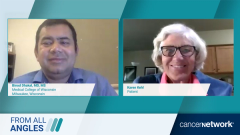
Karen's Story: Navigating Multiple Myeloma Treatment Lines
Panelists discuss how multiple myeloma patients navigate complex treatment journeys through multiple relapses, clinical trials, and the transformative potential of bispecific antibody therapies like talquetamab, with patient Karen Kehl sharing her 15-year experience from initial diagnosis through 19 treatment cycles including three transplants and various clinical trials.
Episodes in this series

Patient Journey and Initial Diagnosis
This Cancer Network program explores bispecific antibodies in multiple myeloma through the personal journey of Karen Kehl, a patient diagnosed in December 2009. Karen's initial symptoms began as seemingly minor issues—a kink in her neck and slight back pain —while she was working as a 3rd and 4th grade teacher and volleyball coach. After initially seeking emergency care over Thanksgiving weekend and receiving only pain medication, her condition worsened by December 11 of that year, when she couldn't dress for school. Fortunately, the on-call physician was an oncologist who quickly diagnosed her multiple myeloma, a cancer she and her daughter had never heard of before. The diagnosis was life-changing and frightening, leaving them breathless as they processed this unexpected news.
Extensive Treatment History
Karen's treatment journey has been extensive and challenging, spanning over 14 years. She underwent 3 transplants: 2 autologous and 1 allogeneic transplant from a 19-year-old donor from Detroit, Michigan. Her initial treatment included Velcade and dexamethasone, though the intravenous Velcade caused neuropathy (now typically given subcutaneously to avoid this adverse effect). The disease significantly impacted her bones, requiring rods in both her femur and humerus due to lesions. Following medical advice, Karen participated in numerous clinical trials, including treatment with a BCMA-directed bispecific antibody before her current therapy.
Current Success with talquetamab
Karen is currently experiencing success with talquetamab, a GPRC5D-directed bispecific antibody therapy, having received her 19th treatment dose. This represents her latest line of therapy after multiple previous treatments and clinical trial participation. The treatment has proven highly effective, with Karen expressing optimism about continuing therapy for as long as it remains beneficial, potentially up to four years based on other patient experiences.
Newsletter
Stay up to date on recent advances in the multidisciplinary approach to cancer.



































